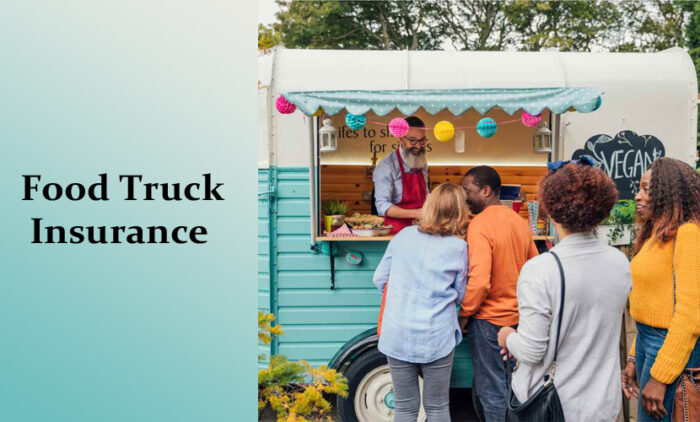Do you run a food truck business? Then I recommend you buy a food truck insurance policy. This is because buying one would protect you from huge financial losses in the event of accidents while running your business.

However, there are different types of coverage that you can explore as a food truck proprietor and have before you begin serving your customers and clients.
In this article, we will highlight some ideas on the types, costs, and many more to assist you in getting the best insurance policy and safeguarding your business.
What Is Food Truck Insurance?
Food truck insurance is a tailored, small commercial policy designed to protect your business from specific risks associated with operating a food truck.
This comprehensive coverage includes protection against accidents, legal issues, income loss, and equipment malfunctions, ensuring the security of your food truck venture.
How Much Does Food Truck Insurance Cost?
The price of food truck insurance differs from other business ventures, and it comes with some potential risks that also differ.
Various factors influence your rate, including the nature of the food you provide. Additionally, the value of your truck and its attached equipment is a determining factor.
For instance, a food truck that is worth $20,000 for attached equipment would get a higher rate than another with $13,000 worth of equipment.
Factors That Influence Food Truck Insurance Pricing
The price of your food truck insurance is determined by several factors. They include:
Insurance Coverage Needs
The extent of coverage you purchase increases the amount of money you pay. For instance, adding coverage types like liquor liability and equipment breakdown insurance to your Business Owners Policy (BOP) increases the overall expense.
However, it’s important not to cut costs on essential coverage, as it may lead you to be underinsured.
Policy Limits
More coverage results in higher insurance premiums. In such cases, consult with an agent to determine the right coverage amounts, finding a balance between adequate protections and avoiding unnecessary expenses.
Number Of Employees
The cost of workers’ compensation insurance increases with the number of employees. So, nore employees result in higher premiums.
Other Cost Factors
Insurers consider various factors such as your business assets, owned business property, payroll size, business location, and your claims history. These elements contribute to the overall calculation of insurance costs.
However, a robust business protection strategy arises from mere compliance and enhances your business’s flexibility while fostering growth.
Types of Food Truck Insurance
There are different types of Food Truck Insurance policies that you can look through as a food truck business owner and opt for the one that suits you. They include:
Business Owner’s Policy (BOP)
Business Owner’s Policy (BOP) merges property and general liability insurance into a single coverage for your business.
In addition, it assists in protecting your ventures against claims arising from incidents such as fire, theft, or other covered losses.
Commercial Auto Insurance
This coverage ensures to safeguard you and your team while driving designated vehicles for work-related purposes.
For instance, in the event of a car accident, this coverage assists in covering medical expenses and property damage.
General Liability Insurance
It safeguards your enterprise and its properties against claims involving negligence, bodily injury, advertising injury, or property damage.
If you do not possess this coverage, you would be responsible for covering the costs associated with such lawsuits.
Workers’ Compensation Insurance
This policy offers benefits to employees recovering from work-related injuries or illnesses. It also pays for medical costs, rehabilitation, and wage loss.
Liquor Liability Insurance
It assists in coverventures engaged in selling, serving, or distributing alcohol. Typically, this type of insurance also protects claims related to bodily injury or property damage caused by a customer under the influence.
However, note that these various types of insurance for food trucks can also be considered types of coverage for food trucks.
In addition, securing your employees and providing coverage for your food truck may mandate the inclusion of general liability insurance.
What Does Food Truck Insurance Cover
A food truck insurance policy coverage varies. But generally, there are several incidents a food truck insurance policy covers. They include:
- Accidents.
- Injuries.
- Illness.
- Lawsuits.
- And equipment breakdown.
What Food Truck Insurance Doesn’t Cover?
Before buying a food truck insurance policy, it is important to know what it covers and what it doesn’t cover. Below is what this insurance policy does not cover:
- Earthquakes.
- Floods.
- Government Possessions.
- Diseases.
- Fraud.
- Radioactive failure.
- War or crisis.
Generally, the above is some of what this type of insurance covers. However, if there are more, the insurance company you will be applying for a policy with will state it to you.
If you’d like some of the above to be covered, you can compare different insurance companies and their coverage and pick one that best suits you. And if none of them covers the above, you can explore other types of insurance policies.
Moreover, possessing the right insurance not only demonstrates your readiness but also serves as a financial safeguard in an unforeseen incident, saving you from financial repercussions.
Factors That Influence Food Truck Insurance
In some situations, insurance rates are determined by various factors, and understanding these factors can help to manage costs. Here are factors that can influence your insurance rate below:
Insurers
Different insurance insurers offer varying rates, emphasizing the importance of comparing options to secure the best deal within the general price range.
State policies
Insurance requirements vary by state, impacting the permits and licenses needed for legal operation in your specific location.
Intended Neighborhood
Factors like crime rates, traffic, and road conditions in your operating neighborhood can influence insurance expenses.
Risk Factors
The nature of the tools and equipment on your food truck introduces varying risk levels. For instance, operating a grill may pose a higher risk than using a refrigerator.
Coverage Amount
Tailoring the level of coverage to your needs influences rates; minimal coverage reduces costs, while maximum coverage increases them.
Deductible Options
The deductible, or the amount paid by the insured party, affects rates; higher deductibles typically result in lower premiums.
The above are some of the factors that influence your food truck insurance. Understanding these factors helps you make informed decisions and optimize your insurance coverage.
Tips To Get Food Truck Insurance
While crafting your food truck business plan, it’s crucial to initiate your quest for the appropriate food truck insurance.
As an integral part of your overall business strategy, securing the right insurance coverage ensures comprehensive protection and financial security for your venture.
To secure cost-effective business insurance, consider the following strategies:
Compare Quotes
Prices for business insurance can vary among providers. Optimize your savings by comparing quotes from multiple companies to identify the most competitive rates.
Bundle Policies
Explore a Business Owners Policy (BOP), which consolidates essential coverage types like general liability, commercial property, and business interruption insurance.
Purchasing these bundled policies often proves more economical than acquiring them individually.
However, you may qualify for further discounts by obtaining other coverage types from the same insurer as your BOP.
Full Premium Payment
Paying your annual premium in full, rather than monthly, may make you eligible for a discount, providing potential savings.
Adjust Auto Insurance Deductible
Consider raising your commercial auto insurance deductible. Opting for a higher deductible means lower premiums, as your insurer’s payout decreases in the event of a filed claim.
Safety Programs
Given the nature of food truck operations involving sharp objects and hot surfaces, implementing and documenting a safety program can potentially lead to savings on workers’ compensation insurance. Demonstrating a commitment to safety may positively influence your insurance costs.
By incorporating these strategies, you can pursue cost-effective business insurance without compromising on essential coverage.
Conclusion
Safeguarding your food business is a priority, and selecting the right provider for your distinct food truck insurance requirements is important.
To ensure comprehensive coverage at reasonable rates, consider insurers offering quality auto and business liability protection.



